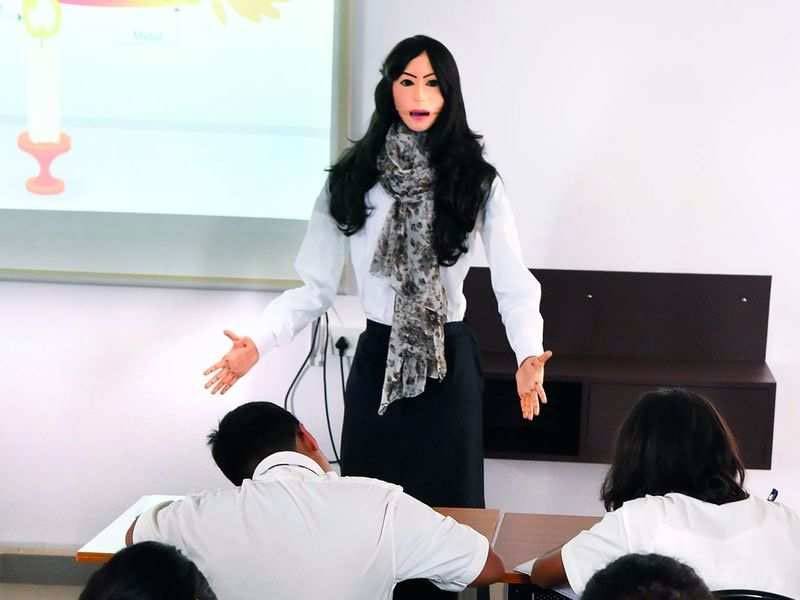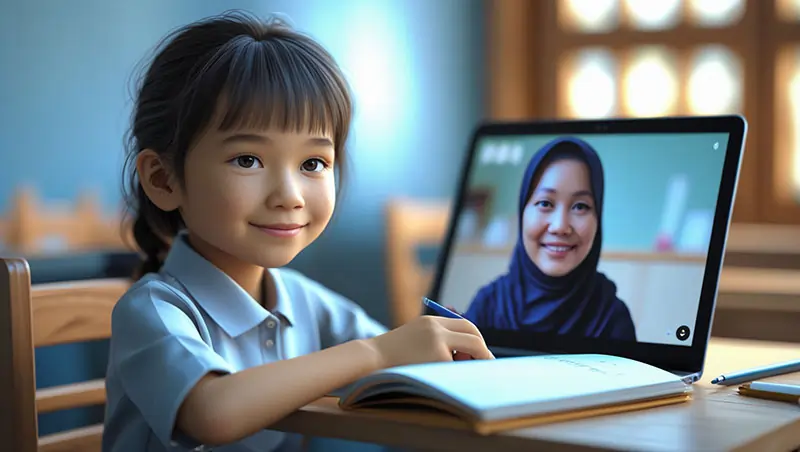Robot Teachers Or Human Teachers?

At Indus International School, Bengaluru, India, Eagle 2.0, a humanoid robot, teachers class 8.It delivers the content of the lesson and asks and answers questions from the class. It may well be the first teacher assistant robot in India.
Elsewhere in the world, robot teachers began ‘teaching’ in schools and colleges ever since the first robot teacher was introduced in Japan in 2009. In the meanwhile there is a raging debate in educational circles on whether robot teachers are better or worse than human teachers.
Robot teachers are more efficient
A robot teacher can store any amount of information, and can make sure that the information is up-to-date. This is something that even the best teacher on earth cannot aspire to do. Moreover, a robot teacher can perform assessments in huge numbers within seconds. This is a great advantage when we think of the hundreds of hours teachers spend manually marking student work.
Robot teachers are unbiased
Well, robots do not have emotions and feelings. Couldn’t it be actually an advantage? No robot teacher will show favoritism in class or discriminate between students in any way. Moreover, a robot teacher can teach according to the needs of the individual students. It is practically impossible for a human teacher to cater to everyone’s individual needs in a big classroom.
Robot teachers are better ‘employees’
This is rather obvious, isn’t it? Robots do not take leave, they never get sick, and do not get into fights with the management! The only time they do not perform is when they have a technical problem, which can be fixed by the IT department anyway. There is no staffroom politics with robot teachers, and no teachers’ unions to contend with!
However, human teachers have certain advantages that robot teachers can never claim to have.
Human teachers teach values
A teacher doesn’t just impart information; he or she is entrusted with molding the future generation, and consciously or unconsciously, passes on values that children readily imbibe. This is what happens when a teacher praises a student who has returned a wallet that was dropped in the playground by someone, or shows tremendous improvement despite difficulties at home. Though there may be teachers who impart the wrong kind of values, this is no reason to turn a blind eye to the millions of teachers who exemplify the qualities of the best teachers and have brought out generations of excellent human beings in the history of human civilization.
Human teachers help students socialize
School is a great place for socialization, and the teacher is a great catalyst for social interactions to happen. A machine could never do that because it would never be able to understand the subtle nuances of interpersonal relationships. It is only a human teacher who can assign a more confident student to mentor a shy new comer, organize group activities in the classroom or crack jokes to bring relief to an intensely geeky class.
Human teachers provide ‘human touch’
All of us can narrate stories of how a particular teacher touched our lives by some random act of kindness, a kind word or a small present. There are teachers who act as substitute mothers, especially in the lower classes. With robot teachers, children will never establish the human connection that is possible to have with human teachers. Teaching is one of the most human of all professions, because it is so much more than just imparting knowledge and assessing knowledge. Many teachers come to love their students, and many students feel the pain of separation from their teachers once they leave school.
So what is the verdict? Which is better: robot teachers or human teachers?
In fact, the best scenario could be a situation where the robot teacher compliments the human teacher. This means that the robot teacher delivers the content of the lesson, even asks questions to students to test their understanding and answers students’ questions, but the ‘human dimension’ is provided by, obviously, the human teacher. This would be an ideal scenario. Let machines handle the mechanical aspects of teaching, namely knowledge transfer. Let human teachers handle what only humans can do, which is to act as a guide, a mentor, or a counselor. This is in fact how robot teachers are employed in many parts of the world, including the one at the Indus International School, in Bengaluru, India.


